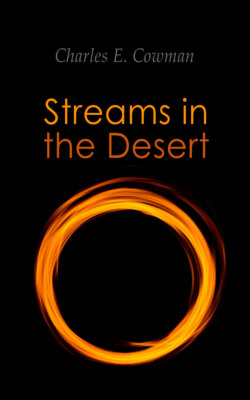Читать книгу Streams in the Desert - Charles E. Cowman - Страница 18
На сайте Литреса книга снята с продажи.
January 16
ОглавлениеTable of Contents
"And there arose a great storm" (Mark 4:37).
Some of the storms of life come suddenly: a great sorrow, a bitter disappointment, a crushing defeat. Some come slowly. They appear upon the ragged edges of the horizon no larger than a man's hand, but, trouble that seems so insignificant spreads until it covers the sky and overwhelms us.
Yet it is in the storm that God equips us for service. When God wants an oak He plants it on the moor where the storms will shake it and the rains will beat down upon it, and it is in the midnight battle with elements that the oak wins its rugged fibre and becomes the king of the forest.
When God wants to make a man He puts him into some storm. The history of manhood is always rough and rugged. No man is made until he has been out into the surge of the storm and found the sublime fulfilment of the prayer: "O God, take me, break me, make me."
A Frenchman has painted a picture of universal genius. There stand orators, philosophers and martyrs, all who have achieved pre-eminence in any phase of life; the remarkable fact about the picture is this: Every man who is pre-eminent for his ability was first pre-eminent for suffering. In the foreground stands that figure of the man who was denied the promised land, Moses. Beside him is another, feeling his way--blind Homer. Milton is there, blind and heart-broken. Now comes the form of one who towers above them all. What is His characteristic? His Face is marred more than any man's. The artist might have written under that great picture, "The Storm."
The beauties of nature come after the storm. The rugged beauty of the mountain is born in a storm, and the heroes of life are the storm-swept and the battle-scarred.
You have been in the storms and swept by the blasts. Have they left you broken, weary, beaten in the valley, or have they lifted you to the sunlit summits of a richer, deeper, more abiding manhood and womanhood? Have they left you with more sympathy with the storm-swept and the battle-scarred? --Selected
The wind that blows can never kill
The tree God plants;
It bloweth east, it bloweth west,
The tender leaves have little rest,
But any wind that blows is best.
The tree that God plants
Strikes deeper root, grows higher still,
Spreads greater boughs, for God's good will
Meets all its wants.
There is no storm hath power to blast
The tree God knows;
No thunderbolt, nor beating rain,
Nor lightning flash, nor hurricane;
When they are spent, it doth remain,
The tree God knows,
Through every tempest standeth fast,
And from its first day to its last
Still fairer grows.
--Selected
